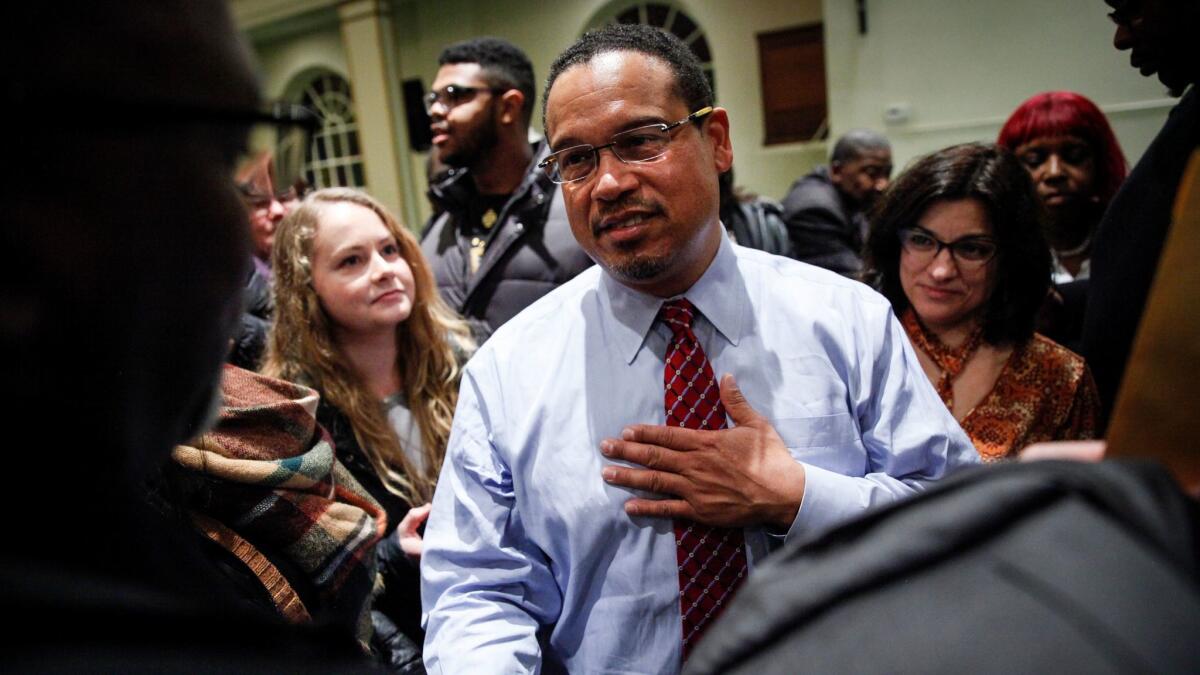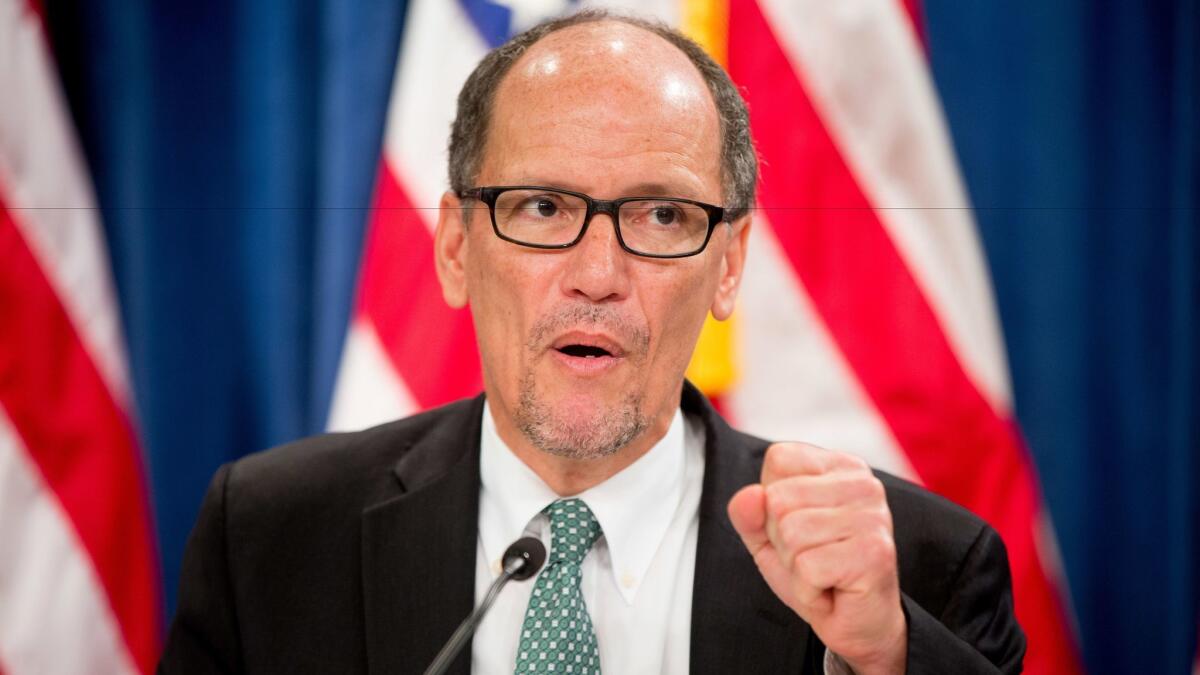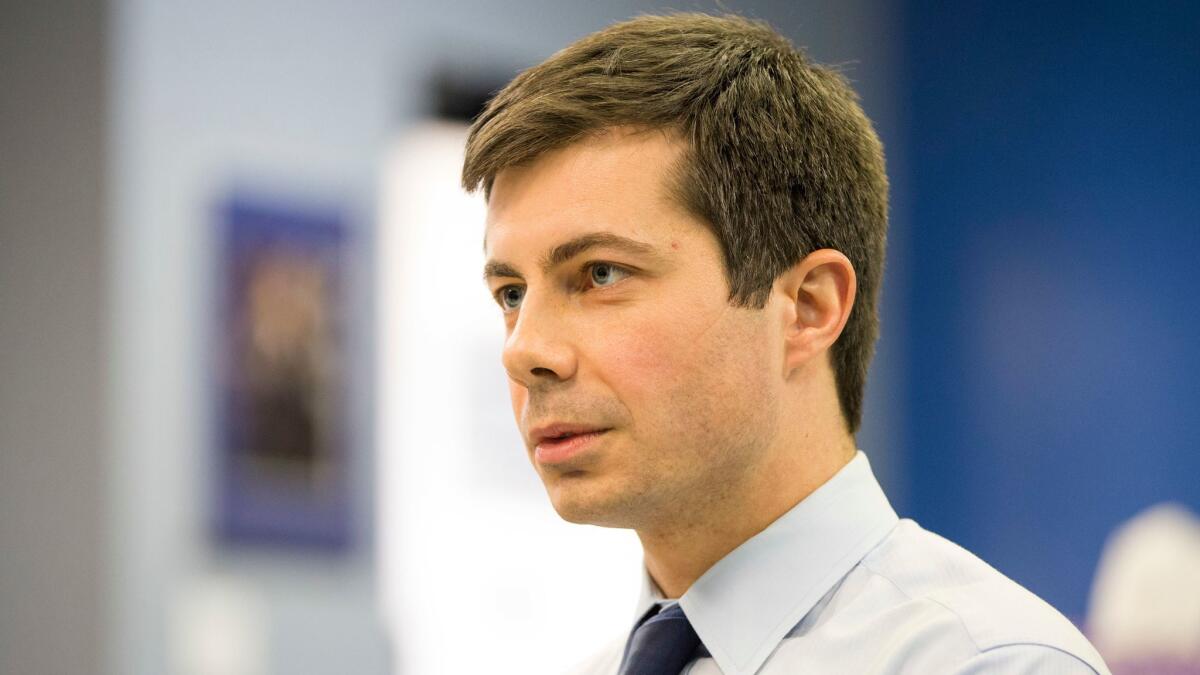After a bruising defeat, Democrats are hunting for a new leader

The candidates vying to be the next leader of the Democratic National Committee agree on one thing: The party needs a major overhaul.
Labor Secretary Thomas E. Perez described the organization as a âfixer-upper.â Rep. Keith Ellison (D-Minn.) said it needs a new culture âdesigned to win elections.â South Bend, Ind., Mayor Pete Buttigieg said Democrats risk being âtuned out.â
Whoever wins the top job will find the task awaiting them is massive. The party has no power in Washington, controls only a third of the governorâs mansions and has 900 fewer state lawmakers than it did when President Obama took office in 2009.
And although the midterm election might sound far off with the 2016 presidential race still a subject of heated debate, the Democratic Party has to raise money, find and groom candidates and create, agree upon and implement an electoral strategy for balloting 22 months away.
Plus, the 447 members of the committee who get to vote on the next chair make up a restive electorate after feeling ignored by previous leadership.
âOnce a year weâre wheeled in at our annual meeting, told how to vote, and then wheeled back out,â said Michael Kapp, a committee member from Los Angeles. âI want to have a conversation. And I want to be listened to.â
These are the hurdles that need to be cleared by the next chair, and thatâs even before turning their attention to possibly unseating Donald Trump as president in 2020.
âItâs important that we rectify our own house even before we have the conversation of how we reengage voters,â said New Hampshire Democratic Chairman Ray Buckley, another candidate for chair.
Trust in the DNC began to fade during last yearâs presidential primary. Critics accused party leadership of preparing a coronation for Hillary Clinton rather than staying neutral. The release of hacked emails after Clinton won the nomination showed some staff members disparaging Sen. Bernie Sanders of Vermont, her tougher-than-expected opponent for the nomination.
Party officials are to cast ballots for chair at a meeting in Atlanta during the last weekend of February, one month after Trumpâs inauguration. But tensions from the primary are simmering.
âSome people are seeing it as a proxy battle, which is really unfortunate,â said Melissa Byrne, a Democratic activist from Philadelphia running for vice chair. âWhatever feelings people have about the primary should be kept in 2016. This is a new year.â
The last competitive race for DNC chair was in 2005, when former Vermont Gov. Howard Dean won after John F. Kerryâs defeat in the presidential election the previous year. President Obama handpicked his committee chairs, as Clinton would have done had she won the election.
Some Democrats are nostalgic for Deanâs signature 50-state strategy, which funded staff members in every state to boost Democratic efforts.
Ellison promised to go a step further during a recent forum for candidates in Texas.
âWhat about a 3,141-county strategy?â he said. âWeâve got to get granular. Weâve got to get to the root.â
Ellison jumped into the race early, positioning himself as a grass-roots leader who secured endorsements from top Democrats and labor leaders. Ellison also has the backing of Sanders, who has tried to parlay his strong showing in last yearâs Democratic primary into a permanent perch for pushing progressive policies.
In an interview, Ellison said he would be Democratsâ door-knocker-in-chief, spending more time rallying voters than spouting talking points on television.
âIâm supposed to be in Erie, Pa., in a flannel shirt in a VFW hall talking to people,â he said. âThatâs my job.â

Ellisonâs early start and big endorsements havenât scared off competitors. Perez announced his candidacy in December, quickly becoming one of the most high-profile candidates in the race because of his relationship with Obama.
Perez also cited Deanâs strategy while promising to reach out to voters around the country.
âWhen youâre not talking to people and youâre not persuading people and you donât have a presence, you donât win elections,â he said. âThe Democratic Party needs to make more house calls. And we need to sit at kitchen tables of voters.â
In a nod to dissatisfaction among party members, Perez said he would strive to be a good listener, citing his experience leading the 16,000-employee Department of Labor.
âThis is about not only who has the vision, but who has the capacity to carry out that vision,â Perez said during the Texas forum.

In a sign of how unsettled the race has been, Buttigieg announced his candidacy almost two months after Ellison did. Heâs seen as an up-and-coming Democrat who received a shout-out from Obama when the president was asked about the future of the party.
Buttigieg, 34, has positioned himself as a fresh face unsullied by the bruising primary between Clinton and Sanders.
âWeâve got to concentrate our energy on the road ahead, and on formulating opposition to a presidency that is like nothing we have seen before,â he said.
The candidates are gathering in Phoenix this weekend for another forum on the future of the party. Others in the running include Jaime Harrison, chair of the South Carolina Democratic Party; Sally Boynton Brown, executive director of the Idaho Democratic Party; and Jehmu Greene, a Fox News political analyst.
Twitter: @chrismegerian
ALSO:
Democrats ask themselves: Now what? Whoâll lead the party from the wilderness, and how?
Texas was Obamaâs chief antagonist. In Trumpâs America, California is eager for the part
Trumpâs approach might seem new, but Arnold Schwarzenegger tried it first. It was a disaster.
More to Read
Get the L.A. Times Politics newsletter
Deeply reported insights into legislation, politics and policy from Sacramento, Washington and beyond. In your inbox three times per week.
You may occasionally receive promotional content from the Los Angeles Times.











